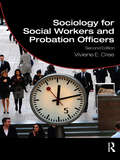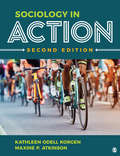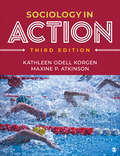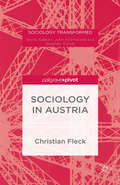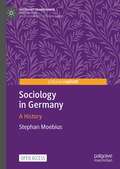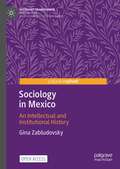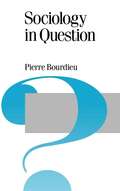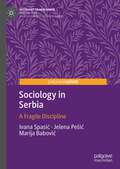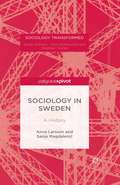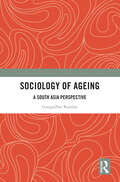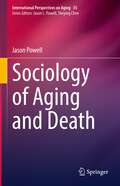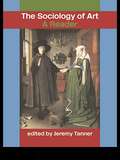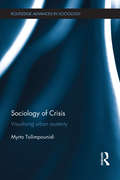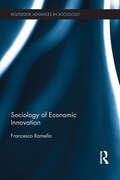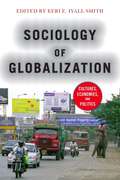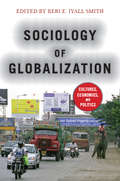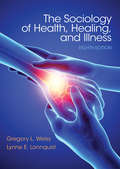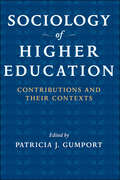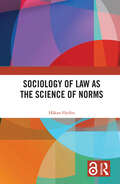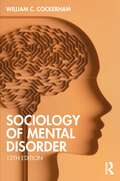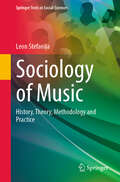- Table View
- List View
Sociology for Social Work: An Introduction
by Alastair Gibson Chris YuillThis excellent textbook introduces the social work student to the field of sociology, illustrating how sociology is connected to and fundamental to effective social work practice. Each chapter applies theory to practice and is uniquely co-written by a sociologist, social worker and service user. A wide range of topics and subjects relevant to social work are covered, including: -Gender -Class -Ethnicity and race -Ageing -Health -Intimacies -Social exclusion -Crime and deviance -Communities -Disability The book comes with access to an exciting companion website offering the reader downloads, web links, powerpoint slides and case studies. Every chapter of the book further includes further case studies, along with lots of clear definitions of terms, and reflection points, making this book the essential introductory text for all social work students.
Sociology for Social Workers and Probation Officers
by Viviene E. CreeHow does a social work student make the connection between sociological knowledge and day-to-day social work? Sociology for Social Workers and Probation Officers provides an introduction to sociological ideas and research and places them firmly into the context of actual social work practice. It encourages readers to develop critical awareness and reach their own judgements about the usefulness and implications of holding certain conceptual positions and shows how social work can be better informed and improved by doing so. Fully revised and updated throughout, this second edition examines sociology in relation to key areas of social work and probation practice, and includes one new chapter. Areas covered are: Family Childhood Youth Community Care and Caring Health and Illness Crime. Essential reading for all social work and probation studies students, this text looks beyond individual and psychological explanations and solutions to develop a sociological knowledge base for social work practice.
Sociology in Action
by Kathleen Odell Korgen Maxine P. AtkinsonWake up your introductory sociology classes! Sociology in Action helps your students learn sociology by doing sociology. Sociology in Action by Kathleen Odell Korgen and Maxine P. Atkinson will inspire your students to do sociology through real-world activities designed to increase learning, retention, and engagement with course material. Packed with new activities and thought-provoking questions to help explain key concepts, the Second Edition of this innovative bestselling text immerses students in an active learning experience that emphasizes hands-on work, application, and learning by example. Each chapter has been updated to reflect recent societal changes including: the causes for and ramifications of the 2016 election; the latest issues facing the LGBT community, people of color, immigrants and refugees, and the shrinking middle class; and student loan debt. The comprehensive Activity Guide that accompanies the text provides everything you need to assign, carry out, and assess the activities that will best engage your students, fit the format of your course, and meet your course goals. Also available as a digital option (courseware). Contact your rep to learn more about Sociology in Action, Second Edition - Vantage Digital Option.
Sociology in Action
by Kathleen Odell Korgen Maxine P. AtkinsonWake up your introductory sociology classes! Sociology in Action helps your students learn sociology by doing sociology. Sociology in Action by Kathleen Odell Korgen and Maxine P. Atkinson will inspire your students to do sociology through real-world activities designed to increase learning, retention, and engagement with course material. Packed with new activities and thought-provoking questions to help explain key concepts, the Second Edition of this innovative bestselling text immerses students in an active learning experience that emphasizes hands-on work, application, and learning by example. Each chapter has been updated to reflect recent societal changes including: the causes for and ramifications of the 2016 election; the latest issues facing the LGBT community, people of color, immigrants and refugees, and the shrinking middle class; and student loan debt. The comprehensive Activity Guide that accompanies the text provides everything you need to assign, carry out, and assess the activities that will best engage your students, fit the format of your course, and meet your course goals. Also available as a digital option (courseware). Contact your rep to learn more about Sociology in Action, Second Edition - Vantage Digital Option.
Sociology in Action
by Kathleen Odell Korgen Maxine P. AtkinsonSociology in Action, Third Edition is an introductory text that encourages doing sociology through real-world activities that emphasize hands-on work, application, and learning by example. Each chapter is written by a specialist in that subject who also shares a passion for active learning. Edited by Kathleen Odell Korgen and Maxine P. Atkinson, this text explains sociology′s key concepts and theories, and pairs that foundational coverage with a series of carefully developed, assignable learning activities that prompt students to think and reflect, observe, analyze, investigate, and apply what they are learning. This title is accompanied by a complete teaching and learning package. Contact your SAGE representative to request a demo. Learning Platform / Courseware SAGE Vantage is an intuitive learning platform that integrates quality SAGE textbook content with assignable multimedia activities and auto-graded assessments to drive student engagement and ensure accountability. Unparalleled in its ease of use and built for dynamic teaching and learning, Vantage offers customizable LMS integration and best-in-class support. It’s a learning platform you, and your students, will actually love. Learn more. Assignable Video with Assessment Assignable video (available in SAGE Vantage) is tied to learning objectives and curated exclusively for this text to bring concepts to life. Watch a sample video now. LMS Cartridge: Import this title’s instructor resources into your school’s learning management system (LMS) and save time. Don’t use an LMS? You can still access all of the same online resources for this title via the password-protected Instructor Resource Site. Learn more.
Sociology in Action
by Kathleen Odell Korgen Maxine P. AtkinsonSociology in Action, Third Edition is an introductory text that encourages doing sociology through real-world activities that emphasize hands-on work, application, and learning by example. Each chapter is written by a specialist in that subject who also shares a passion for active learning. Edited by Kathleen Odell Korgen and Maxine P. Atkinson, this text explains sociology′s key concepts and theories, and pairs that foundational coverage with a series of carefully developed, assignable learning activities that prompt students to think and reflect, observe, analyze, investigate, and apply what they are learning. This title is accompanied by a complete teaching and learning package. Contact your SAGE representative to request a demo. Learning Platform / Courseware SAGE Vantage is an intuitive learning platform that integrates quality SAGE textbook content with assignable multimedia activities and auto-graded assessments to drive student engagement and ensure accountability. Unparalleled in its ease of use and built for dynamic teaching and learning, Vantage offers customizable LMS integration and best-in-class support. It’s a learning platform you, and your students, will actually love. Learn more. Assignable Video with Assessment Assignable video (available in SAGE Vantage) is tied to learning objectives and curated exclusively for this text to bring concepts to life. Watch a sample video now. LMS Cartridge: Import this title’s instructor resources into your school’s learning management system (LMS) and save time. Don’t use an LMS? You can still access all of the same online resources for this title via the password-protected Instructor Resource Site. Learn more.
Sociology in Austria since 1945 (Sociology Transformed)
by C. FleckSociology in Austria has been frequently affected by political developments in the country. This first history of sociology in Austria examines the impact of the break-up of the Habsburg Empire and of two consecutive dictatorships, which destroyed academic freedom by means of forced migration and imprisonment. Even after 1945 the re-established Second Republic did not dismiss professors promoted during the Nazi period, and failed to invite exiled academics to return home. The author argues that the result has been a continuation of favouritism and conformism, with compliance to political regimes sanctioned at the expense of meritocracy and that in the light of this chequered past we should celebrate instances of de-institutionalization.
Sociology in Germany: A History (Sociology Transformed)
by Stephan MoebiusThis open access book traces the development of sociology in Germany from the late 19th century to the present day, providing a concise overview of the main actors, institutional processes, theories, methods, topics and controversies. Throughout the book, the author relates the discipline’s history to its historical, economic, political and cultural contexts. The book begins with sociology in the German Reich, the Weimar Republic, National Socialism and exile, before exploring sociology after 1945 as a ‘key discipline’ of the young Federal Republic of Germany, and reconstructing the periods from 1945 to 1968 and from 1968 to 1990. The final chapters are devoted to sociology in the German Democratic Republic and the period from 1990 to the present day. This work will appeal to students and scholars of sociology, and to a general readership interested in the history of Germany.
Sociology in Mexico: An Intellectual and Institutional History (Sociology Transformed)
by Gina ZabludovskyThis open access book presents a condensed history of Sociology in Mexico from its origins, through to the middle of the 19th century and up to the present day. The book analyses the interaction between sociology and the main economic, political and social change in the country, including the 1910 Mexican Revolution, the main social movements, the role of the intellectual exiles from Spain and Latin America, and the participation of women, who have often remained invisible in the history of sociology. The book explores how sociological discourse played a fundamental role in the separation of secular and public education and the search for a ‘national project’ from 1868 onwards, despite the lack of an institute of social research until 1930; how sociology became an autonomous social science, led by a few intellectuals and public figures, as it became institutionalized in universities, and the effect this had on the development of the discipline; the influence of Marxism during the 1970s; and the progression from a process of specialization after the fall of the Berlin Wall to a new trend of working in collective projects with an increasing interdisciplinary perspective in the first decades of the 21st century.
Sociology in Question
by Pierre BourdieuThe works of Pierre Bourdieu occupy a central place in the current development of world sociology. This volume offers an accessible but challenging introduction to Bourdieu′s ideas. In a series of discussions, lectures and interviews, the range of Bourdieu′s ideas is laid out and its relation to other disciplines and other sociological schools is explored. The issues developed include the sociology of culture, leisure and taste; the intrinsic reflexivity of social science; and the role of language in society and social sciences.
Sociology in Serbia: A Fragile Discipline (Sociology Transformed)
by Ivana Spasić Jelena Pešić Marija BabovićThis book represents the first comprehensive century-long history of the disciplinary development of sociology in Serbia in English. It provides an overview of the constitution of sociology as an academic discipline during the interwar period, its reinstitutionalization after World War II in entirely new social circumstances marked by establishment of self-management socialism in Yugoslavia, and finally its development during the turbulent postsocialist period. Divided into five chapters, the focus of the book is on the challenges that sociology has faced in order to maintain its institutional position, gain adequate social recognition, and preserve its professional autonomy. Relying on Bourdieu's concept of the academic field and Burawoy's typology of Professional, Critical, Public and Policy sociology, the book seeks to answer the question of how the sociological academic field in Serbia has been constituted, structured and restructured, and in which of these roles sociology has dominantly appeared in different phases of its evolution.
Sociology in Sweden: A History (Sociology Transformed)
by Anna Larsson Sanja Magdaleni?This book offers a brief but comprehensive overview of the history of sociology in Sweden from the prewar period to the present day. It focuses in particular on scientific boundaries, gender and the relationship between sociology and the Swedish welfare state.
Sociology of Ageing: A South Asia Perspective
by Gangadhar KaralayThis book examines the biological, psychological, and sociocultural aspects of challenges related to ageing in India. It does so by widely referring to research works beyond the disciplinary boundary of sociology to help develop a lucid yet critical understanding of sociological ageing.Apart from providing an invaluable introduction to the major issues involved in the study of ageing from a sociological perspective, this book discusses demographic perspective, social dimensions, social support, and state policies in detail. It aptly describes challenges faced by elderly people and avenues of opportunities available to them to remain actively engaged in life.This book would be useful to the students, researchers and teachers of Sociology, Social Work, Public Health and Psychology. It would also be an invaluable companion to professionals working in the field of Gerontology, Health and Social care, and NGOs working with older people.
Sociology of Aging and Death (International Perspectives on Aging #35)
by Jason PowellThis book presents a critical analysis and examination of the major theories and social issues in the social construction of aging and death. It is concerned with the impact of death and places how our experiences of death are transformed by the roles that truth and discourse about aging play in everyday life. A major element of the book is an examination of the way in which groups and individuals employ specific representations of mortality in order to construct meaning and purpose for life and death. To accentuate this, the book provides an investigation into the social construction of death practices across time and space. Special attention is given to the notion of death as a socially accomplished phenomenon grounded in a unique sociological introduction to the meaning of death throughout history to the present. The purpose of this book is to critically inform debates concerning the abstract and empirical features of death examined through the lens of sociological perspectives. This book explores the emergent biomedical dominance relating to ageing and death. An alternative is advocated which re-interprets ageing for Graduate schools. This innovative book explores the concept, history and theory of aging and its relationship to death. Traditionally, many books have focused on older people dying of 'natural causes', a biomedical explanatory framework. This book looks at alternative social theories and experiences with aging and relate to death in different countries, victims, crime, imprisonment and institutional care. Are these deaths avoidable? If so, what are the solutions the book addresses. This is one of the first books that re-interprets aging and its relationship of examples of death. It will be of essential reading for graduate students and researchers in understanding these different examples of aging and death across the globe.
Sociology of Art: A Reader
by Jeremy TannerIntroducing the fundamental theories and debates in the sociology of art, this broad ranging book, the only edited reader of the sociology of art available, uses extracts from the core foundational and most influential contemporary writers in the field. As such it is essential reading both for students of the sociology of art, and of art history. Divided into five sections, it explores the following key themes: * classical sociological theory and the sociology of art * the social production of art * the sociology of the artist * museums and the social construction of high culture* sociology aesthetic form and the specificity of art. With the addition of an introductory essay that contextualizes the readings within the traditions of sociology and art history, and draws fascinating parallels between the origins and development of these two disciplines, this book opens up a productive interdisciplinary dialogue between sociology and art history as well as providing a fascinating introduction to the subject.
Sociology of Crisis: Visualising Urban Austerity (Routledge Advances in Sociology)
by Myrto TsilimpounidiThe global financial crisis has demonstrated the impact and implications of late capitalism and its bedfellow, globalisation. In the European context, crisis is seen as a threat to the stability of the region, rather than a local or national concern. Post-2008, crisis is social and political, rather than merely financial, as Western countries witness the consequences of consumption, growth and profit. In this book, Tsilimpounidi demonstrates how sociologists must develop new approaches to examining rapid shifts in the social landscape, since crisis is not merely reflected in balance sheets, but is mediated through spectacular imagery of loss, deprivation and increased vectors of marginalisation. Providing focused and valuable insight into the pressing problems of those living in Greece in relation to the wider spheres of the nation and at the level of the European Union, Sociology of Crisis takes an approach that is firmly located within a critical sociological appeal to reflexivity. A timely engagement with the problem of crisis at a macro-level and in dialogue with the everyday experiences of crisis on a micro-level, this interdisciplinary title will appeal to both undergraduate and postgraduate students interested in sociology, social policy, geography, urban studies and research methods (social science).
Sociology of Economic Innovation (Routledge Advances in Sociology)
by Francesco RamellaThis book offers a sociological overview of the theories and research on economic innovation. Over the past few decades, the economics of innovation has given rise to a lively flow of studies, and innovation studies continues to develop as an interdisciplinary field of research. Sociology in general, and economic sociology in particular, have already made a significant contribution to innovation and continue to play a crucial role in this emerging field. This book presents an integrated sociological approach to the study of economic innovation. It explores the key theories and sociological research on innovation, as well as other contributions to the field of Innovation Studies from economists, geographers, and psychologists. Ramella argues that in order to understand the processes of innovation, it is necessary to look at the actors of innovation, at the relations that exist between them and at the sectoral and territorial contexts in which they operate. For students, this book includes international case studies throughout, as well as further study questions at the end of each chapter.
Sociology of Globalization
by Keri E. Iyall SmithA rich collection of diverse voices,Sociology of Globalizationexamines the processes of globalization as well as its impact on people around the world. It looks beyond the headlines, stereotypes, and hype and features a balanced selection of classic scholarship and theory, cutting-edge research, and engaging journalism. Key pieces from prominent scholars, journalists, and theorists will resonate with students, stretch the classroom into their daily lives, and give the study of globalization concrete meaning. Each of three sections-culture, economy, and politics-begins with an original introduction from the editor which familiarizes readers with essential themes and concepts and provides necessary context for the readings that follow. Useful resources for further research, including websites, films, and class exercises, are also provided to exemplify and add relevance to major topics. Accessible and expansive, this is the ideal primary reader or supplement for undergraduate courses on the sociology of globalization.
Sociology of Globalization
by Keri E. Iyall SmithA rich collection of diverse voices, Sociology of Globalization examines the processes of globalization as well as its impact on people around the world. It looks beyond the headlines, stereotypes, and hype and features a balanced selection of classic scholarship and theory, cutting-edge research, and engaging journalism. Key pieces from prominent scholars, journalists, and theorists will resonate with students, stretch the classroom into their daily lives, and give the study of globalization concrete meaning. Each of three sections--culture, economy, and politics--begins with an original introduction from the editor which familiarizes readers with essential themes and concepts and provides necessary context for the readings that follow. Useful resources for further research, including websites, films, and class exercises, are also provided to exemplify and add relevance to major topics. Accessible and expansive, this is the ideal primary reader or supplement for undergraduate courses on the sociology of globalization.
Sociology of Globalization: Cultures, Economies, and Politics
by Keri E. SmithA rich collection of diverse voices, Sociology of Globalization examines the processes of globalization as well as its impact on people around the world. It looks beyond the headlines, stereotypes, and hype and features a balanced selection of classic scholarship and theory, cutting-edge research, and engaging journalism. Key pieces from prominent scholars, journalists, and theorists will resonate with students, stretch the classroom into their daily lives, and give the study of globalization concrete meaning. Each of three sections (culture, economy, and politics) begins with an original introduction from the editor which familiarizes readers with essential themes and concepts and provides necessary context for the readings that follow. Useful resources for further research, including websites, films, and class exercises, are also provided to exemplify and add relevance to major topics. Accessible and expansive, this is the ideal primary reader or supplement for undergraduate courses on the sociology of globalization.
Sociology of Health, Healing, and Illness
by Gregroy L. Weiss Lynne E. LonnquistA comprehensive presentation of the major topics in medical sociology. The Sociology of Health, Healing, and Illness, 8/e by Gregory L. Weiss and Lynne E. Lonnquist provides an in-depth overview of the field of medical sociology. The authors provide solid coverage of traditional topics while providing significant coverage of current issues related to health, healing, and illness. Readers will emerge with an understanding of the health care system in the United States as well as the changes that are taking place with the implementation of The Affordable Care Act.
Sociology of Higher Education: Contributions and Their Contexts
by Patricia J. Gumport&“Outstanding . . . it presents a comprehensive state of the field, and it explores the role of sociological research in guiding higher education practice.&” —Choice In this volume, Patricia Gumport and other leading scholars examine the sociology of higher education as it has evolved since the publication of Burton Clark&’s foundational article in 1973. They trace diverse conceptual and empirical developments along several major lines of specialization and analyze the ways in which wider societal and institutional changes in higher education have influenced this vital field of study. In her own chapters, Gumport identifies the factors that constrain or facilitate the field&’s development, including different intellectual legacies and professional contexts for faculty in sociology and in education. She also considers prospects for the future legitimacy and vitality of the field. Featuring extensive reviews of the literature, this volume will be invaluable for scholars and students of sociology and higher education.
Sociology of Law as the Science of Norms (Studies in the Sociology of Law)
by Håkan HydénThis book proposes the study of norms as a method of explaining human choice and behaviour by introducing a new scientific perspective. The science of norms may here be broadly understood as a social science which includes elements from both the behavioural and legal sciences. It is given that a science of norms is not normative in the sense of prescribing what is right or wrong in various situations. Compared with legal science, sociology of law has an interest in the operational side of legal rules and regulation. This book develops a synthesizing social science approach to better understand societal development in the wake of the increasingly significant digital technology. The underlying idea is that norms as expectations today are not primarily related to social expectations emanating from human interactions but come from systems that mankind has created for fulfilling its needs. Today the economy, via the market, and technology via digitization, generate stronger and more frequent expectations than the social system. By expanding the sociological understanding of norms, the book makes comparisons between different parts of society possible and creates a more holistic understanding of contemporary society. The book will be of interest to academics and researchers in the areas of sociology of law, legal theory, philosophy of law, sociology and social psychology.
Sociology of Mental Disorder
by William C. CockerhamThe twelfth edition of the Sociology of Mental Disorder presents the major issues and research findings on the influence of race, social class, gender, and age on the incidence and prevalence of mental disorders. The text also examines the institutions that help those with mental disorders, mental health law, and public policy. Many important updates are new to this edition: The mental health effects of the COVID-19 pandemic are examined. Aging and mental health is discussed in more detail. Updated review of gender differences in mental disorder. A revised and more in-depth discussion of mental health and race. Problems in the community care of the mentally ill are covered. Updates of research and citations throughout. Blending foundational concepts and sociological perspectives on mental health issues with newer studies and accounts in an accessible and authoritative survey of the field, the new edition of Sociology of Mental Disorder remains an essential text and an invaluable resource for students and scholars.
Sociology of Music: History, Theory, Methodology and Practice (Springer Texts in Social Sciences)
by Leon StefanijaThe textbook provides students with insight into and overview of the basics of social research on music. It addresses the Who, What, When, Where, Why, How of music research through four perspectives from the sociological study of music: a historical survey of the social study of music (when), theoretical points of view (what), and methodological (how), and pragmatic aspects (who, why & how). The other Ws (where and why) are included within the four main perspectives. The four perspectives – history, theory, methodology, and practice – are complementary. Some of the names included in the theory and practice of music are also listed as a part of the history of music sociology, and vice versa. In this way, the book encompasses what Howard S. Becker has conceptualized as an art world, Kurt Blaukopf as musical practice, and Christopher Small as musicking. Covering all the relevant details yet concise in structure, this book is ideal for students of the sociology of music, musical education, musicology and of arts and aethestics.

